Kenneth Atchity's Blog, page 192
December 21, 2013
Cuba Amerian Bar Association Features George J. Fowler's My Cuba Libre
Published on December 21, 2013 00:00
December 18, 2013
Guest Post: Twelve Social Media Predictions for 2014 by Penny C. Sansevieri,
 The past year saw a lot of changes in social media. Google's social site, Google+, saw huge growth and more activity, LinkedIn really got in the game, and Pinterest continued to pull in more traffic and more sales. Visuals also really became front and center and led the way for infographics, Vine video, and Instagram. To some degree, however, we're still finding our way in social. So many sites, so little time has driven us to be more particular about the sites we are on and, instead of talking at our user, we speak to them - we communicate. In the coming year you'll see more of this and I think that by the end of 2014 the social media landscape will look very, very different. Here is where I think we are headed:
The past year saw a lot of changes in social media. Google's social site, Google+, saw huge growth and more activity, LinkedIn really got in the game, and Pinterest continued to pull in more traffic and more sales. Visuals also really became front and center and led the way for infographics, Vine video, and Instagram. To some degree, however, we're still finding our way in social. So many sites, so little time has driven us to be more particular about the sites we are on and, instead of talking at our user, we speak to them - we communicate. In the coming year you'll see more of this and I think that by the end of 2014 the social media landscape will look very, very different. Here is where I think we are headed:Google+ is no longer an option: Let's start first with the obvious and also with an apology. When Google launched Google+ (G+) I rolled my eyes and hoped it would fail like the other social media platform Google started. Why? Because we have so many social networking sites - do we really need one more? Apparently we do. G+ has gone from being a footnote to a game-changer and in order to get ranked on Google, G+ must be part of your social sites because their posts count towards your search ranking; those with the most active G+ profiles will have the best online presence. I'm sorry G+ that I ignored you for so long, I promise it won't happen again.
Numbers Don't Matter: There was a time when we all clamored for a huge number of followers, so much so that some folks were buying Twitter followers on eBay. Now it seems that while big numbers are great, engagement is better. How many people are sharing your stuff, retweeting your content or, in the case of G+ adding a +1 to your content? That's the key to a solid presence online. Are you getting people to talk back to you, communicate with you and then communicate to your people how great you are? Think of it this way, what if you were speaking to a huge crowd of people but they all fell asleep during your presentation. Rude? Maybe. But also perhaps an indicator that you need to be more engaging or, at the very least say something to keep them from falling asleep.
Visuals rock: We've seen it with the growth of Pinterest and the popularity of Instagram. We also see it in the engagement on G+ that images aren't just a fun way to dress up your social media site, they are mandatory. Social networks are becoming much more image-driven and the challenge with images is that you can't just throw something up there and hope it will inspire engagement (like pictures of your food or your cup of coffee as if most of us have never seen either before). Even posting images on Twitter helps to increase the views to your tweet. We're also now seeing more of a surge in Slideshare which is a fantastic place for speakers to share presentation slides and (even if you aren't a speaker) you can put together a short slide show covering a particular topic. Invest in some royalty-free images that you can use with all of your posts and, please repeat at me: I will never post a single update to Facebook, Twitter, or G+ without an image.
Video, Video: What's the second biggest search engine on the planet? Would you be surprised if I said it was YouTube? Think about it. You're searching a video on your favorite song or a how-to on just about anything. Where will you go? That's right: YouTube. In 2014 you're going to see even more momentum to this site, but you'll also see a huge surge in micro-videos. We know that since the inception of Vine more and more people are using short burst videos to share product information or other stuff related to their business. But I believe as attention spans continue to shrink that you'll see more and more of these quick, short and hyper-focused videos. People love the quick step-by-step tips as opposed to the longer videos they have to sift through to get information. If you a have a video plan in place, consider doing short micro videos of a minute or less.
LinkedIn: When I talk to business people just about every single one of them is on LinkedIn. I love LinkedIn, though it's been discouraging that in recent months LinkedIn has been somewhat of a free-for-all. If you're on there you've no doubt noticed things like group spamming and the odd "endorsement" thing which I'm not sure even makes sense or helps your ranking. In 2014 LinkedIn is really going to clean up its act and if you're in business and not on there, you'll be missing out on a lot of networking. LinkedIn will become an even bigger business driver with enhanced options and a better filtering system. I believe in 2014 their growth will be staggering. Mostly because as you've no doubt noticed, Facebook has changed, and not always in great ways.
Facebook: And speaking of Facebook, this site will go almost completely paid in 2014. Sure, you'll still be able to have free accounts on there but if you want any of your posts on Facebook Pages to get seen by new people, you'll need to pay for it. I believe that nearly everything to do with Pages will be in a paid format. I think they have the branding, exposure, and traffic to pull this off. Not everyone will be happy and, in my view, Facebook should be careful because G+ is knocking on their door.
Mobile: Did you know that by the end of 2013 there will be more mobile devices than people? That's a pretty staggering concept! It's a given that mobile will get bigger in 2014. Have you checked your site in mobile? Do you know whether folks are accessing your website via a computer or phone? Check your analytics to be sure, Google Analytics will tell you how and when folks are accessing your site. It's important to know this because for those of you who have high mobile engagement, you'll want to explore creating a mobile version of your site. WordPress has a lot of mobile plug-ins that serve this purpose.
All together now: When was the last time you were on Foursquare? I know. Me, too. I had a huge flurry of activity there and then just dropped off. The "check in" feature was unique, at least until Facebook started doing more of that and offering options to link to locations when you posted on the site. Let's face it, can we really keep track of all of these sites? Wouldn't it be easier if we had one site that did it all? I believe that's where we will be headed and something we'll see more of as the New Year progresses. Does this mean you should punt certain social sites? No, by all means stay where you are getting activity. I just think that more and more you're going to see smaller sites getting absorbed into bigger social sites. Frankly, the social media funnel needs to be easier and streamlined. Sure you can cross post and that's great. But once G+ or Facebook start offering some more sophisticated post scheduling, planning, and tracking features, will you really need scheduling systems like HootSuite and Tweetdeck? It's worth considering that some of these sites, while helpful now, may be a bit of overkill in the future.
MySpace: Remember that site? They tried a reboot not that long ago but I think they still have just that one user, you know the guy who joins everyone's MySpace account? That said, I do think that MySpace is geared for a change and 2014 will be make it or break it for them. If they can't create some exposure for their site in the coming year, MySpace will go the way of Napster. Oh, remember that site? But I think there will be some funding for this site, because there's an appeal to the music crowd which has always been its primary audience. Also, the changes that Facebook may make could help drive more people here, too. Think of it: you're a band on Facebook but you don't have the money to pay for placement that will get you visibility to a new market, what do you do? You hop onto a site that will help you gain fans.
Empowering Fans: We're seeing this more and more, that consumers trust other consumers. WalMart tried this in their fake posting fiasco some years back. I think that in 2014 companies will be spending much more time building fans who are willing to help them spread the word about their service or product because they love it so much. How will they do this? Well, certainly there could be share "incentives" but I think that we're looking for a company that treats us so good, we can't wait to share it with a dozen friends and family. Companies finding ways to build more word-of-mouth traffic will be key. Unique ways of delivering a product, over-the-top customer service, and a product or service that delivers beyond a customer's expectations won't be the exception, but the rule.
Twitter: What started out as a watercooler site has turned into so much more. I'm actually not surprised that Twitter did so well during its public offering because it's more than just a social media site. It's a newsroom, a central place to share thoughts or (in the case of Scandal) a series of OMG's. Twitter, in a sense, has become a hub, the center of town where information collects. There is a hashtag for (almost) everything. Not much will change on this site, expect for more paid/visibility opportunities. But it will continue to grow in 2014. If you aren't on Twitter, or aren't sure how to use it, just try following a hashtag related to whatever you're interested in and chime in. Conversation is easy on this site. You just have to contribute.Of all of the social sites, this site will continue to be a game-changer.
Hashtags: This used to be just a way to search on Twitter, now it's a way to search globally. If you're not using hashtags in all of your social posts, you are missing out on a lot of traffic. In 2014 I think that using hashtags will be mandatory in order to bring visibility to your posts. People are searching on terms, we see that everywhere. You can pop a hashtag into Google and it'll give you options to search all of the different feeds. While Hashtags were helpful for social search in 2013, in the coming year they will be required.
While I don't have a crystal ball, I do think that we'll see huge changes in the way we communicate with our audiences. Consumers hate being sold to, so building loyal fans will be important. It's also no longer mandatory to be on every single social site. Remember it's not being about everywhere, it's about being everywhere that matters. The moral? Find your ideal social site(s) and a message that inspires, educates, engages and entertains your followers, and you'll build a dedicated tribe.

Published on December 18, 2013 00:00
December 17, 2013
Alan Roth Among Nicholl's Fellows

Four individual writers and one writing team have been selected as winners of the 2013 Academy Nicholl Fellowships in Screenwriting competition. This year's winners are Frank DeJohn & David Alton Hedges ("Legion"), Patty Jones ("Joe Banks"), Alan Roth ("Jersey City Story" end left), Stephanie Shannon ("Queen of Hearts"), Barbara Stepansky ("Sugar in My Veins").

Published on December 17, 2013 00:00
December 16, 2013
Berge'rs Book Reviews: Dennis Palumbo's Night Terrors is ... " Satisfying and Enjoyalbe Read"
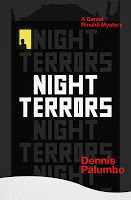
Daniel Rinaldi has settled back into his psychotherapy practice after his last case with the Pittsburgh police department (Fever Dream). So he’s surprised when the FBI suddenly pulls him into a new case, this time involving a serial killer.
After a serial killer of prostitutes is killed in prison, those who had been directly associated with his arrest and murder are now being targeted by someone who calls himself “Your Biggest Fan.” But even though those suspected to be on his hit list are being held in protective custody by the FBI, someone seems to have immediate access to their wherabouts. A retired FBI profiling agent, Lyle Barnes, is high on the hit list, and Rinaldi is asked to help him deal with his night terrors. But Barnes isn’t interested in FBI protection, and quickly escapes.
Meanwhile, Rinaldi is also involved in another case involving the killing and brutal dismemberment of a businessman. A young man comes forth and confesses to the crime, but his mother insists he’s innocent. Something about the case bothers Rinaldi. Is it possible this murder is somehow linked to the serial killer?
Night Terrors is a fast-paced thriller with great action and drama, pulling the reader in from the first page. As I’ve gotten to know Daniel Rinaldi, I like him more and more. Great characters, a well-constructed mystery, and a little romance make this a really satisfying and enjoyable read.
Reviewer: Alice Berger

Published on December 16, 2013 11:29
December 14, 2013
Story Merchant Books Launches Bruises: Divorce, Crazyland, Jiu-jitsu...a Memoir by Michael R. Simpson
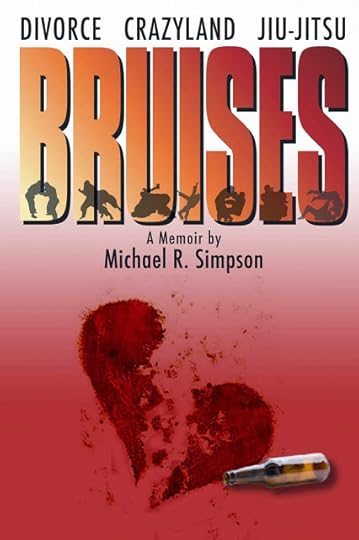

Mike was trapped in *Crazyland——that’s a term he’d coined for that place between marriage and divorce. He was spending too much time at the bars, in the beds of strange women, on “spring break” in Mexico…and in his own head. This thirty-six-year-old yuppie was every kind of messed up. And it wasn’t like he didn’t know it. He was smart——an engineer running his own company, a father of two and he had been married for over ten years. Then one day he “blinked” and went from blending in beautifully in blissful suburbia to becoming the mayor of Crazyland (yes, the vote was unanimous).

Published on December 14, 2013 00:00
December 13, 2013
Mother Love Interviews Dennis Walsh about Nobody Walks: Bringing My Brother's Killers to Justice
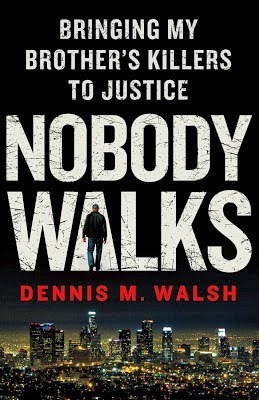

“Every once in a great while, a true crime is written that pulls at the heartstrings, while it also provides a tale of suspense that will be remembered for a good long time. This is that story.”
—Suspense Magazine
“Walsh, a criminal defense attorney for 30 years, tells the blistering true story of the 2003 murder of one of his brothers, Christopher, who was discovered in a trash barrel in a California storage locker. Despite law enforcement’s reluctance to pursue the case since the author’s father and younger brother were in prison on drug charges, Walsh shoulders the burden and delves into the nadir of the criminal underworld, quizzing thieves, skinheads, Nazi bikers, hookers, and porn queens to construct something meaningful from various lies and schemes. Good leads dead-end and seemingly ironclad confessions crumble, but the author’s resourcefulness and determination to catch his brother’s killers keep this sordid tale moving along at a quick clip. Walsh keeps his law practice operating throughout the ordeal, but still finds time to persuade reluctant witnesses to offer their testimony and cooperate with authorities; after four years of sleuthing, the trial finally begins. The hearing is a real corker, chock-full of twists and turns, and written with passion and an eye for drama. Taut and relentless, this chronicle of a former cold case puts one man’s resolve and the American idea of justice to the test.”
—Publishers Weekly
“Pulpy, engrossing account…Walsh captures the arc of his family’s involvement in an act of senseless malice, calling into question the cultural endurance of macho violence within certain subcultures and the difficulty of holding men responsible for horrific acts within the legal system’s overtaxed framework. Gritty, effective, personalized tale of the outlaw lifestyle and its consequences.”
—Kirkus Reviews

Published on December 13, 2013 00:00
Rainbows for Hana: Mourning Our Cat Brought Us a Miracle by Kenneth Atchity FIVE DAY GIVEAWAY 12/12 - 12/16


When our beloved tabby flew out the window to her death, our devastation was transformed by a mysterious series of events that seemed to us like miracles.
As we landed in Los Angeles after a trip to Rome, two events occurred nearly simultaneously: my granddaughter Meggie spotted a unique and most glorious rainbow, and my wife Kayoko received a call on her cell phone from a man who found Hana on the ground, unmoving. From that moment of agony Hana reached out from across the rainbow to displace the grief in our hearts with joy. It’s a story that anyone who’s ever loved a pet will not forget.

Published on December 13, 2013 00:00
December 11, 2013
My Addiction Interviews Michael R Simpson Author of Bruises
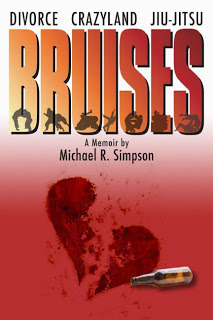 Bruises the novel, is said to be the novel anyone should read that goes through a divorce. Read it before you near the edge of Crazyland. Michael R Simpson lays down the rules—tell-tale signs that indicate what to look out for when you’re knocking on that door —The door to Crazy land. Bruises: Divorce, Crazyland, Jui-Jitsu—the memoir’s now available on Amazon in Kindle and paperback.
Bruises the novel, is said to be the novel anyone should read that goes through a divorce. Read it before you near the edge of Crazyland. Michael R Simpson lays down the rules—tell-tale signs that indicate what to look out for when you’re knocking on that door —The door to Crazy land. Bruises: Divorce, Crazyland, Jui-Jitsu—the memoir’s now available on Amazon in Kindle and paperback.
Michael, it’s a huge honor to host you on the M.A blog. As you might know by now, M.A strives to bring readers and writers closer together.
As per the normal cliché at the start of most interviews, would you mind giving readers a bit more detail about yourself, your background etc?
Thank you for having me. Here is the Cliff Note version of my background:
• Born 1968 - San Luis Obispo, California;
• Dad - school principal and Mayor of Pismo Beach;
• Mother - English professor and stock broker;
• Parents divorced 1976;
• Graduated SLOHS 1986 2.6 GPA (I lied 2.5 GPA);
• Arizona State University 1986 – 1992 BSE Civil Engineering 2.5 GPA (I didn’t lie this time);
• Met girl of my dreams 1990;
• Married 1992;
• Daughter 1995;
• Licensed professional civil engineer 1997;
• Son 2000;
• MBA Arizona State University 2002-2004 3.5 GPA (swear to God!);
• Divorced the girl of my dreams 2004;
• First tour of Crazyland 2004; and
• They will have to read Bruises for the rest of the tale.
You took the leap from Engineering to writing, what made you decide to take the leap?
Warning: this is dry boring engineering dribble, the reader is advised to skip to question 3.
There actually was no leap. The cliché is that engineers do math and draft plans. But, in reality before any plans are prepared, engineers prepare reports, a lot of reports; everything from traffic impact studies, to soils reports, to environmental impact studies, grants and drainage studies.
Are you sleeping yet?
Those reports are then used by city planners, developers, and politicians to justify the project (or argue against) and those reports are used by other engineers and disciplines to complete their respective designs. A good engineer must be a good writer; they must be able to convey concepts and physical issues to other professionals and to the average concerned citizen.
What made you decide to write?
In spite of my Mom being an English professor at Cal Poly and my Dad being an elementary school principal, I hated writing in high school and in college. I spent a year trying to appease my English professors with less passive voice and more active voice. I think I got straight “C’s” in my English classes. However, I have always tried to live an adventurous life; one that is interesting; one that is worth living. And what is the point of doing something interesting if you don’t tell someone? I have always liked fact over fiction, and at the age of 45, I believed that I had amassed enough life experiences and adventures to actually have something interesting, funny, and eye-opening to say.
When did you decided to take the leap from just writing into being published?
I met this quirky, eclectic waitress at Red Lobster in 1989. We dated and then didn’t and even hitch hiked home from Mexico. We lost touch and she went on to become a TV actress and write two books. Two years ago, I read those books and sent her a note. Sometimes friends are the greatest motivators. We have been in touch ever since. She encouraged me to write a book. Her name is Lisa Cerasoli and she edited Bruises.
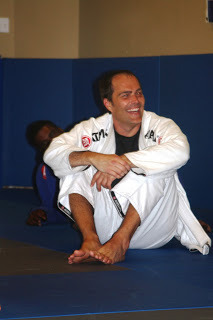 Bruises broaches onto the reality of break up’s, divorce and healing. It’s something I myself can’t comprehend. What exactly made you write it?
Bruises broaches onto the reality of break up’s, divorce and healing. It’s something I myself can’t comprehend. What exactly made you write it?
I am a bucket list kind of guy. I look out into the world and see all of the possibilities of things that can be done before I die. I pick the best, or at least what I perceive to be the best and then go do them. Writing a book was on that list. I thought about fiction—I even have a few great ideas, but as Mark Twain said, “Truth is stranger than fiction, but it is because Fiction is obliged to stick to the possibilities; Truth isn’t.” So, I wrote about an aspect of my life; one of those bucket list adventures that I’ve been immersed in for about a decade now. For clarity, jiu-jitsu was the bucket list item, not divorce, they just happened at about the same time.
Also, I like the idea that something exists in this world that says “Michael R. Simpson was here and this is who he was.” I mean, I’m an engineer working on hurricane Katrina recovery in New Orleans. My name and signature are on hundreds if not thousands of documents in New Orleans, but that is just my name; it tells the future world very little about me. This book conveys exactly who I am and who I was—the good, bad, funny, crude, insightful, mature, immature, all of it, the entire beautiful mess.
Every writer always gives a piece of him/herself within their story. How close to your own reality is Bruises?
Spot on.
How has the novel been received by readers thus far?
Very well, I am waiting for my Pulitzer as we speak.
Seriously though, I really enjoy hearing about or reading that I made people laugh. And, the reviews and comments that shock me and give me a certain amount of pride are those that either compare my work to a famous writer or simply comment on the voice I used to project my tale or thoughts.
There was a guy from Chicago who came to train at NOLA BJJ (Brazilian Jiu-jitsu of New Orleans). I was out of town, but my friends at the school told him to buy the book. I never met him and he wrote a review that compared Bruises to A Confederacy of Dunces. I mean that is some cool fucking shit. Remember, I was a “C” student.
Another person got my email address and sent me a note regarding a certain part of the book (I don’t want to spoil the part) in which he said “Tears in my eyes, that’s about as good as humor gets, my compliments. I compare it to Twain’s Fenimore Cooper’s Literary Offense —arguably the best very humor ever written.”
How can I not be humbled by these kinds of comparisons?
What was your initial hope for the novel?
I had set out several times to write a book and failed. So, this time I told myself I had to write 40 pages before I let anyone in on the fact that I was writing a book. I also set the goals that, no matter how bad it was, I would finish it and that I would write every day, even if it was only one word.
My initial hope was to just finish it. My second hope was that I could create something that I would be proud of. My third hope was to make enough off of it that it paid for the time I put into it. I can say that I met the first two goals.
Jiu-jitsu does come forth as a very manly sport. It’s understandable that most people lean towards something physical in the hope that it would help them focus, remain real etc when they have to deal with pain. What sets Jiu-jitsu apart from the other sports?
To answer what sets jiu-jitsu apart, I will quote Bruises:
“Before jiu-jitsu, I would go out and run and run and run, sometimes until I puked. The psychology of the running made me feel like I was running away from the problem. But when I ran, I was still thinking about my problems. There was no escape from my own mind, and when I returned from the run, the anger and sadness were still with me. Apparently I was being chased by those fuckers. Other times, I retreated to a bar for the escape. That never worked, in case anyone’s wondering.
As soon as I found jiu-jitsu, I had found a place that was not a bar. And it wasn’t a long run till I puked. This small room with a padded floor and padded walls had become many things to me: my church, my therapist, my gym. When I rolled there was no time to think about problems. When a man is trying to choke you, there is no time for running through all of the bullshit of the day. There is only one task at hand, kill or be killed. The insanity and the desperation of the six-minute round quieted my mind. I was too tired to be angry or sad, and the endorphin buzz created after rolling, whether I was killed or not, left me feeling elated. So, after two hours of mind-quieting six-minute intervals, my mind was reset like a computer that was rebooted. I would leave the gym and all of my problems and emotions seemed to stay there, like the sweat that was left on the mat and in my gi.”
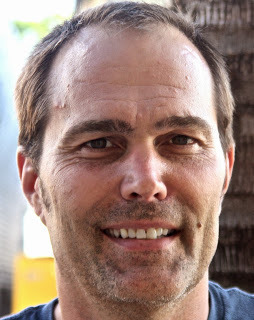 Where can readers connect with you?
Where can readers connect with you?
I set up a website michaelrsimpson.com. I have a real job, so the website is a work in progress, but I plan on blogging there several times a month.
If they want to meet me in person, I can be found on the mats of NOLA BJJ in New Orleans several times a week and sometimes on the mats of Megaton Brazilian Jiu-jitsu in Phoenix.And of course, they can purchase the book on Amazon.
Future plans?
1. Black belt2. Another book3. Scuba dive Truk lagoon where Japanese WWII ships were sunk4. Bike across the US5. Start flying again6. Something big and complicated7. Live the dreamSee? I’m a total bucket list guy.
Words of wisdom to those in pain?
Go train jiu-jitsu, it has saved many people—both men and women. Life is short and this world is a giant playground. Don’t waste too much time wallowing in sadness. If the pain is divorce, well, welcome to Crazyland, get your passport stamped and get out as quickly as possible. Thanks so much for sharing yourself with M.A’s loyal following. We wish you well in all your future endeavours. Thank you so much for having me and allowing me to discuss my book.
Reposted from My Addiction

Published on December 11, 2013 01:00
My Addiction Interviews Michael R Simpson – Bruises
 Bruises the novel, is said to be the novel anyone should read that goes through a divorce. Read it before you near the edge of Crazyland. Michael R Simpson lays down the rules—tell-tale signs that indicate what to look out for when you’re knocking on that door —The door to Crazy land. Bruises: Divorce, Crazyland, Jui-Jitsu—the memoir’s now available on Amazon in Kindle and paperback.
Bruises the novel, is said to be the novel anyone should read that goes through a divorce. Read it before you near the edge of Crazyland. Michael R Simpson lays down the rules—tell-tale signs that indicate what to look out for when you’re knocking on that door —The door to Crazy land. Bruises: Divorce, Crazyland, Jui-Jitsu—the memoir’s now available on Amazon in Kindle and paperback.
Michael, it’s a huge honor to host you on the M.A blog. As you might know by now, M.A strives to bring readers and writers closer together.
As per the normal cliché at the start of most interviews, would you mind giving readers a bit more detail about yourself, your background etc?
Thank you for having me. Here is the Cliff Note version of my background:
• Born 1968 - San Luis Obispo, California;
• Dad - school principal and Mayor of Pismo Beach;
• Mother - English professor and stock broker;
• Parents divorced 1976;
• Graduated SLOHS 1986 2.6 GPA (I lied 2.5 GPA);
• Arizona State University 1986 – 1992 BSE Civil Engineering 2.5 GPA (I didn’t lie this time);
• Met girl of my dreams 1990;
• Married 1992;
• Daughter 1995;
• Licensed professional civil engineer 1997;
• Son 2000;
• MBA Arizona State University 2002-2004 3.5 GPA (swear to God!);
• Divorced the girl of my dreams 2004;
• First tour of Crazyland 2004; and
• They will have to read Bruises for the rest of the tale.
You took the leap from Engineering to writing, what made you decide to take the leap?
Warning: this is dry boring engineering dribble, the reader is advised to skip to question 3.
There actually was no leap. The cliché is that engineers do math and draft plans. But, in reality before any plans are prepared, engineers prepare reports, a lot of reports; everything from traffic impact studies, to soils reports, to environmental impact studies, grants and drainage studies.
Are you sleeping yet?
Those reports are then used by city planners, developers, and politicians to justify the project (or argue against) and those reports are used by other engineers and disciplines to complete their respective designs. A good engineer must be a good writer; they must be able to convey concepts and physical issues to other professionals and to the average concerned citizen.
What made you decide to write?
In spite of my Mom being an English professor at Cal Poly and my Dad being an elementary school principal, I hated writing in high school and in college. I spent a year trying to appease my English professors with less passive voice and more active voice. I think I got straight “C’s” in my English classes. However, I have always tried to live an adventurous life; one that is interesting; one that is worth living. And what is the point of doing something interesting if you don’t tell someone? I have always liked fact over fiction, and at the age of 45, I believed that I had amassed enough life experiences and adventures to actually have something interesting, funny, and eye-opening to say.
When did you decided to take the leap from just writing into being published?
I met this quirky, eclectic waitress at Red Lobster in 1989. We dated and then didn’t and even hitch hiked home from Mexico. We lost touch and she went on to become a TV actress and write two books. Two years ago, I read those books and sent her a note. Sometimes friends are the greatest motivators. We have been in touch ever since. She encouraged me to write a book. Her name is Lisa Cerasoli and she edited Bruises.
 Bruises broaches onto the reality of break up’s, divorce and healing. It’s something I myself can’t comprehend. What exactly made you write it?
Bruises broaches onto the reality of break up’s, divorce and healing. It’s something I myself can’t comprehend. What exactly made you write it?
I am a bucket list kind of guy. I look out into the world and see all of the possibilities of things that can be done before I die. I pick the best, or at least what I perceive to be the best and then go do them. Writing a book was on that list. I thought about fiction—I even have a few great ideas, but as Mark Twain said, “Truth is stranger than fiction, but it is because Fiction is obliged to stick to the possibilities; Truth isn’t.” So, I wrote about an aspect of my life; one of those bucket list adventures that I’ve been immersed in for about a decade now. For clarity, jiu-jitsu was the bucket list item, not divorce, they just happened at about the same time.
Also, I like the idea that something exists in this world that says “Michael R. Simpson was here and this is who he was.” I mean, I’m an engineer working on hurricane Katrina recovery in New Orleans. My name and signature are on hundreds if not thousands of documents in New Orleans, but that is just my name; it tells the future world very little about me. This book conveys exactly who I am and who I was—the good, bad, funny, crude, insightful, mature, immature, all of it, the entire beautiful mess.
Every writer always gives a piece of him/herself within their story. How close to your own reality is Bruises?
Spot on.
How has the novel been received by readers thus far?
Very well, I am waiting for my Pulitzer as we speak.
Seriously though, I really enjoy hearing about or reading that I made people laugh. And, the reviews and comments that shock me and give me a certain amount of pride are those that either compare my work to a famous writer or simply comment on the voice I used to project my tale or thoughts.
There was a guy from Chicago who came to train at NOLA BJJ (Brazilian Jiu-jitsu of New Orleans). I was out of town, but my friends at the school told him to buy the book. I never met him and he wrote a review that compared Bruises to A Confederacy of Dunces. I mean that is some cool fucking shit. Remember, I was a “C” student.
Another person got my email address and sent me a note regarding a certain part of the book (I don’t want to spoil the part) in which he said “Tears in my eyes, that’s about as good as humor gets, my compliments. I compare it to Twain’s Fenimore Cooper’s Literary Offense —arguably the best very humor ever written.”
How can I not be humbled by these kinds of comparisons?
What was your initial hope for the novel?
I had set out several times to write a book and failed. So, this time I told myself I had to write 40 pages before I let anyone in on the fact that I was writing a book. I also set the goals that, no matter how bad it was, I would finish it and that I would write every day, even if it was only one word.
My initial hope was to just finish it. My second hope was that I could create something that I would be proud of. My third hope was to make enough off of it that it paid for the time I put into it. I can say that I met the first two goals.
Jiu-jitsu does come forth as a very manly sport. It’s understandable that most people lean towards something physical in the hope that it would help them focus, remain real etc when they have to deal with pain. What sets Jiu-jitsu apart from the other sports?
To answer what sets jiu-jitsu apart, I will quote Bruises:
“Before jiu-jitsu, I would go out and run and run and run, sometimes until I puked. The psychology of the running made me feel like I was running away from the problem. But when I ran, I was still thinking about my problems. There was no escape from my own mind, and when I returned from the run, the anger and sadness were still with me. Apparently I was being chased by those fuckers. Other times, I retreated to a bar for the escape. That never worked, in case anyone’s wondering.
As soon as I found jiu-jitsu, I had found a place that was not a bar. And it wasn’t a long run till I puked. This small room with a padded floor and padded walls had become many things to me: my church, my therapist, my gym. When I rolled there was no time to think about problems. When a man is trying to choke you, there is no time for running through all of the bullshit of the day. There is only one task at hand, kill or be killed. The insanity and the desperation of the six-minute round quieted my mind. I was too tired to be angry or sad, and the endorphin buzz created after rolling, whether I was killed or not, left me feeling elated. So, after two hours of mind-quieting six-minute intervals, my mind was reset like a computer that was rebooted. I would leave the gym and all of my problems and emotions seemed to stay there, like the sweat that was left on the mat and in my gi.”
 Where can readers connect with you?
Where can readers connect with you?
I set up a website michaelrsimpson.com. I have a real job, so the website is a work in progress, but I plan on blogging there several times a month.
If they want to meet me in person, I can be found on the mats of NOLA BJJ in New Orleans several times a week and sometimes on the mats of Megaton Brazilian Jiu-jitsu in Phoenix.
And of course, they can purchase the book on Amazon.
Future plans?
1. Black belt2. Another book3. Scuba dive Truk lagoon where Japanese WWII ships were sunk4. Bike across the US5. Start flying again6. Something big and complicated7. Live the dreamSee? I’m a total bucket list guy.
Words of wisdom to those in pain?
Go train jiu-jitsu, it has saved many people—both men and women. Life is short and this world is a giant playground. Don’t waste too much time wallowing in sadness. If the pain is divorce, well, welcome to Crazyland, get your passport stamped and get out as quickly as possible.
Thanks so much for sharing yourself with M.A’s loyal following. We wish you well in all your future endeavours.
Thank you so much for having me and allowing me to discuss my book.
Reposted from My Addiction

Published on December 11, 2013 01:00
December 10, 2013
Santa Cruz News Features Nicole Sallak-Anderson's eHuman Dawn

eHuman Dawn: A Santa Cruz author’s first scifi novel hits e-bookshelvesDecember 5, 2013
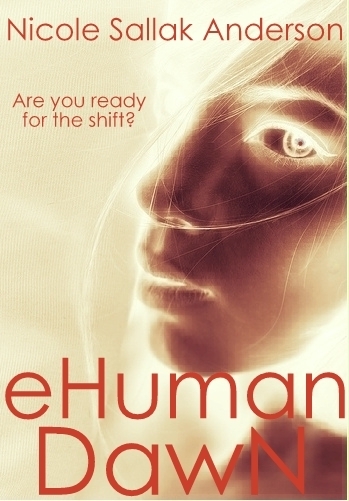 Nicole Sallak Anderson has always loved writing, but at 18, when she was going to college, her father wasn’t exactly keen on the idea of pursuing it as a career.
Nicole Sallak Anderson has always loved writing, but at 18, when she was going to college, her father wasn’t exactly keen on the idea of pursuing it as a career.Instead, she earned a degree from Purdue University and became a software engineer – a field she loved – and worked in encryption and network security software for years.
She never gave up her dream of writing though, and now she’s found a way for her two interests to intersect.
About three years ago, she woke up with an idea for a science fiction novel after a vivid dream. She wrote down some notes and when her two sons — now ages 12 and 14 — headed back to school that fall, she started writing what would become her first published novel. At first she wasn’t necessarily intent on getting it published, but the more she wrote, the more she became determined to get it out there for others to read. A writing conference in San Rafael helped her get a better handle on how to pitch an agent and she also got herself a writing coach and an editor. After pitching numerous editors, she finally got a bite.
Her book, eHuman Dawn, is now available for purchase as an e-book, and it’s just the first in what she says is a trilogy.
Deciding to go the e-book route first appealed to Nicole because she liked the immediacy and she liked the idea of not having to wait for a book to come out in print edition first. And given the topic of her novel, the medium seemed contextually appropriate.
So what’s eHuman Dawn about? Well, to put it simply, it’s about the future possibility in a post-singularity world, says Nicole.
Here’s the blurbage from the publisher:
The Great Shift is coming…. are you ready to jump?
Fast forward to the year 2242–a world in which death, disease, war and famine have been conquered, and where everything, including humans, are devices on Neuro, a complex network operating system that is controlled via human thought. Adam Winter has lived for nearly two hundred years in an eHuman body–a man of metal, fiber optics and plastic, on a world where no one dies and no one is born. Paradise on earth–until Adam discovers that the World Government is cutting power to entire cities, and his own city is on the list!
Trapped in a body that must recharge on the network, Adam is swept up into the underworld of an eHuman anti World Government resistance, led by Dawn, the very first eHuman created. While the Resistance wages war against those in power, Dawn reveals to Adam a shocking secret about their past that not only bonds them together, but is also the Resistance’s ticket to gaining control over Neuro and taking down the World Government once and for all. Caught between the past and the future, Adam must rise up, claim his inheritance, and face his destiny– before eHumanity is powered down, forever.Essentially, the story is set in a world where we no longer have humans in the way we now think of that term. Instead we have non-carbon humanoid forms, aka “eHumans,” who lack flesh and must be recharged like an electronic appliance. Memories and thoughts are produced and controlled by software and other programs provided by one overarching network.
Protagonist Adam Winter is approached by a member of the resistance, a group of eHumans who come together and determine they don’t want their thoughts, desires and wants to be controlled by this network any longer. Winter, a journalist, becomes intricately involved with the movement and with Dawn, the first eHuman ever created and the woman who initially approaches him.
The book explores the role of emotions and sex in a world where technology is the leading power, but it isn’t a romance novel per se. The romance is there, Nicole says, but it’s balanced with discussions of science and technology and its role in our lives.
Nicole says she had started thinking a lot about our connections to technology and our attachment to the electronic devices we’ve come to rely on. What would happen, she wondered, if we became the devices ourselves – providing us with a sense of immortality but also subjecting us to the limitations of technology? The intersections of technology and human consciousness are something she contemplates often.
“I’ve just always had a fascination with the technology and the mind – as well as the body and feelings, and the concepts of how the body works,” she says.
She also adds something that’s largely missing from the science fiction and technology world – a female voice.
eHuman Dawn is currently available on Amazon and it it might make a great gift for your science-fiction loving and eReader-owning friends and family, hint hint.
Be sure to check out her Facebook page, blog and Twitter feeds too, where she actively writes and interacts about many of the same topics she focuses on in her novel. And don’t worry – she’s already got most of the sequel written.
Reposted From Santa Cruz News

Published on December 10, 2013 00:00




